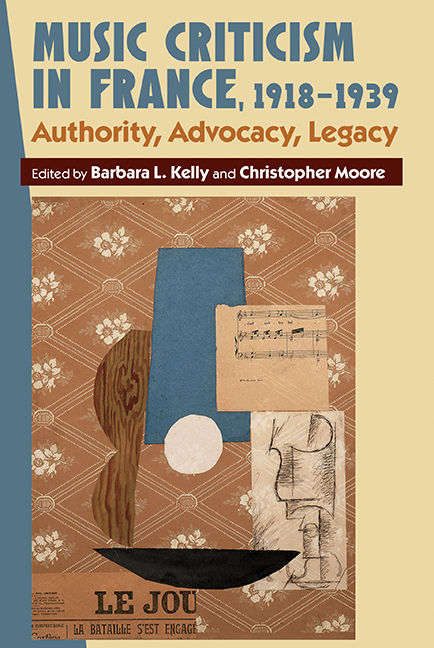Book contents
- Frontmatter
- Contents
- List of Figures
- List of Tables
- List of Contributors
- Acknowledgements
- Introduction: The Role of Criticism in Interwar Musical Culture
- 1 Music Criticism and Aesthetics During the Interwar Period: Fewer Crimes and More Punishments
- 2 Nostalgia and Violence in the Music Criticism of L'Action française
- 3 Charles Koechlin: The Figure of the Expert
- 4 Bleu-horizon Politics and Music for Radio Listeners: L'Initiation à la musique (1935)
- 5 Common Canon, Conflicting Ideologies: Music Criticism in Performance in Interwar France
- 6 Arthur Honegger: Music Critic for Musique et Théâtre (1925–1926)
- 7 A Woman's Critical Voice: Nadia Boulanger and Le Monde musical, 1919–1923
- 8 From a Foreign Correspondent: The Parisian Chronicles of Alejo Carpentier
- 9 Debussy's ‘Reputational Entrepreneurs’: Vuillermoz, Koechlin, Laloy and Vallas
- 10 The Legacy of War: Conceptualising Wartime Musical Life in the Post-War Musical Press, 1919–1920
- 11 Satie, Relâche and the Critics: Controversies and Legacy
- 12 Creating a Canon: émile Vuillermoz's Musiques d'aujourd'hui and French Musical Modernity
- Selected Bibliography
- Index
10 - The Legacy of War: Conceptualising Wartime Musical Life in the Post-War Musical Press, 1919–1920
Published online by Cambridge University Press: 17 July 2019
- Frontmatter
- Contents
- List of Figures
- List of Tables
- List of Contributors
- Acknowledgements
- Introduction: The Role of Criticism in Interwar Musical Culture
- 1 Music Criticism and Aesthetics During the Interwar Period: Fewer Crimes and More Punishments
- 2 Nostalgia and Violence in the Music Criticism of L'Action française
- 3 Charles Koechlin: The Figure of the Expert
- 4 Bleu-horizon Politics and Music for Radio Listeners: L'Initiation à la musique (1935)
- 5 Common Canon, Conflicting Ideologies: Music Criticism in Performance in Interwar France
- 6 Arthur Honegger: Music Critic for Musique et Théâtre (1925–1926)
- 7 A Woman's Critical Voice: Nadia Boulanger and Le Monde musical, 1919–1923
- 8 From a Foreign Correspondent: The Parisian Chronicles of Alejo Carpentier
- 9 Debussy's ‘Reputational Entrepreneurs’: Vuillermoz, Koechlin, Laloy and Vallas
- 10 The Legacy of War: Conceptualising Wartime Musical Life in the Post-War Musical Press, 1919–1920
- 11 Satie, Relâche and the Critics: Controversies and Legacy
- 12 Creating a Canon: émile Vuillermoz's Musiques d'aujourd'hui and French Musical Modernity
- Selected Bibliography
- Index
Summary
On 15 August 1914, Parisians settling down to peruse the latest copy of the weekly music periodical, Le Ménestrel, were greeted with the following notice:
In the exceptional circumstances that we face, Le Ménestrel will do its best to continue publication … But we must note that things are becoming increasingly hard for us and sourcing musical news becomes more and more difficult, most of our correspondents being absent; there are even gaps amongst our regular contributions. Printers and typographers are also rare, and paper, consumed in large amounts by the political journals, threatens to run out soon.
The seemingly dismal situation reported by the publication's director was not limited to Le Ménestrel alone. With the declaration of war in early 1914, publishing houses faced a number of practical and economic problems to overcome in order to continue operations. A large proportion of the publishing industry's workforce was of mobilisation age, resulting in a lack of manpower. The situation was exacerbated by shortages of primary materials: paper was in short supply throughout the war, with government forced to restrict the number of grams available to publishers, and regulations limiting both paper and fuel consumption for businesses were issued by the Préfecture on an ever-changing basis.
Daily newspapers were frequently curtailed in length, or appeared in smaller format, with the result that column space more usually reserved for concert and operatic reviews was frequently sacrificed for news of the fighting fronts. The situation was worse for dedicated music periodicals, with many forced to cease publication during the conflict. Whilst Le Ménestrel hoped to continue publication in a reduced format of four, rather than eight, pages throughout the war, it was eventually forced to abandon its plans, publishing its last wartime issue on 5 September 1914 and remaining silent until after the Armistice. Other important music periodicals such as Le Monde musical and Le Guide musical were to suffer the same fate, although some did manage to publish occasional wartime issues. However, Parisians were not entirely deprived of musical news. Le Courrier musical, directed by the critic Charles Tenroc, was able to continue for much of the war, with the exception of an initial hiatus from mid 1914 to 1916.
- Type
- Chapter
- Information
- Music Criticism in France, 1918–1939Authority, Advocacy, Legacy, pp. 245 - 266Publisher: Boydell & BrewerPrint publication year: 2018
- 1
- Cited by

